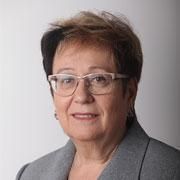My major research activities are focused on the development and study of ion-transport phenomena in composite solid electrolytes and new nanostructured electrodes for advanced energy-storage devices.
Solid electrolytes, in which ion conducting polymers are combined with superionic ceramics, could revolutionize electrochemical energy storage devices because of their nontoxicity, stability during operation and enhanced safety. However, the interfacial resistance between the ceramic and polymer phases strongly suppresses the ionic conductivity and presents the main obstacle for these materials. The primary goal of our research is to gain fundamental understanding of mechanisms controlling lithium and sodium ion transport in polymer-ceramic composites with a distinct focus on reducing energy barrier for the interfacial ion transport and improving cation transference number. The work includes synthesis of novel polymer electrolytes and functionalized ceramic particles with large number of defects and low-activation barrier interface.
In the development of innovative power sources, freeing from design limitation along with the synthesis of reliable electrochemical materials with well-tuned features, is considered to be the most important prerequisite. Two approaches for the fabrication of flexible free form-factor batteries are under development in our group. The first one is a unique, single-step concurrent electrophoretic deposition (EPD) method for the preparation of a membrane-electrode assembly. We study the mechanism of EPD and the complex interplay between AC/DC voltage, zeta-potential, deposition rate, morphology, and electrochemical activity of different materials.
The second approach utilizes 3D printing techniques. We suggest a novel core/multi-shell free form-factor battery design and develop flexible all-solid-state electrolytes and electrodes by fused-filament fabrication (FFF).
In collaboration with Prof. S. Fleisher and Prof. E. Peled we have recently developed the Terahertz (THz) time-domain spectroscopy method for in-operando characterization of the silicon-electrolyte interphase dynamics in a working lithium battery. Strong correlation between THz data and electrochemical characterization allows monitoring the formation and evolution of solid electrolyte interphase (SEI) during reversible lithiation of the silicon anode. We plan to expand the use of THz method for the characterization of a variety of phenomena occurring on electrodes and in electrolytes of batteries.


